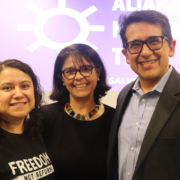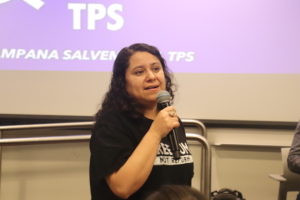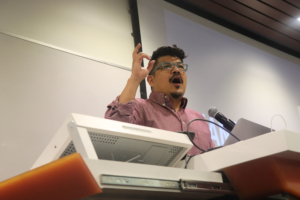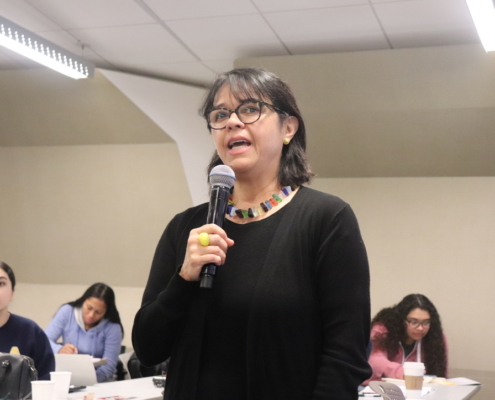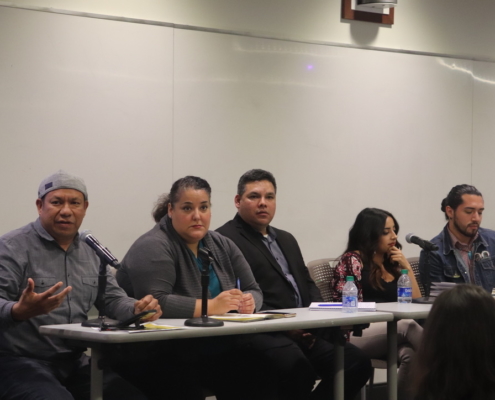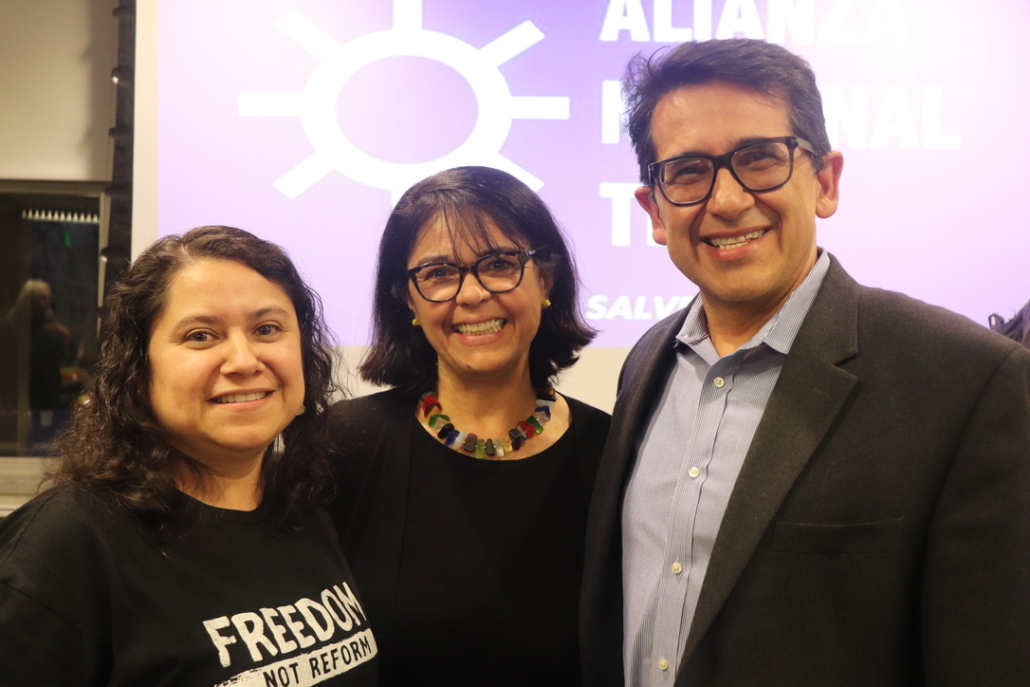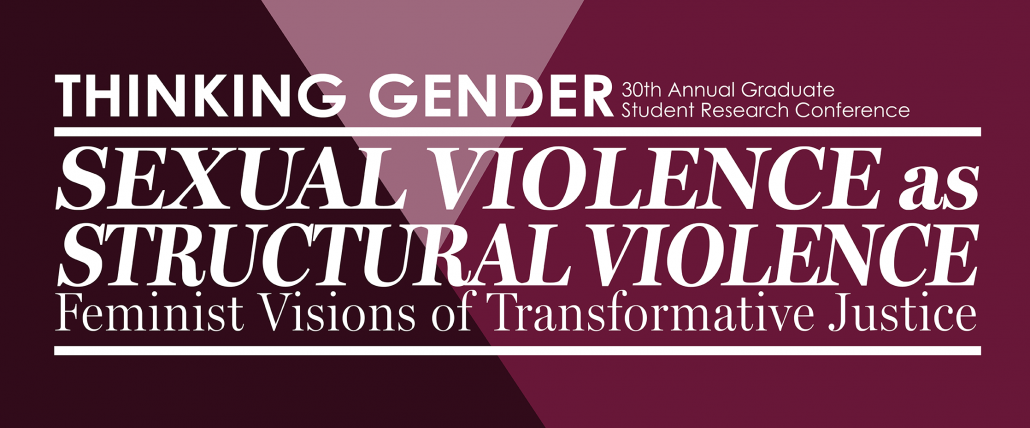
By Bryanna Ruiz and Amado Castillo, Latino Policy & Politics Initiative (LPPI) Public Policy Fellows
The UCLA Center for the Study of Women held its 30th Annual Graduate Student Thinking Gender Conference in early March, in order to honor Women’s History Month. The annual conference was co-sponsored by various research centers and organizations, including the UCLA Latino Policy and Politics Initiative (LPPI). The conference focused on feminist, queer, trans, identities and anti-carceral, transnational, and intersectional approaches to sexual violence. In light of the #MeToo movement and other movements aiming to combat sexual violence, this conference proved necessary in order to discuss approaches to justice and restoration that center the needs of communities of color.
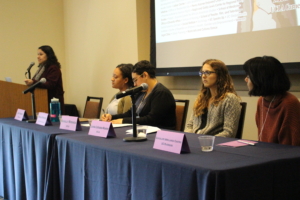 The conference, “Thinking Gender: Sexual Violence as Structural Violence Feminist Visions of Transformative Justice,” centered on the work of graduate students who studied sexual abuse cases in different contexts, including within communities in Uganda and Latinx communities. One of the first panels to open up the conference was “Extractive Economies and Sexual Violence,” moderated by LPPI faculty expert Dr. Leisy Abrego, who offered critical insight into the research papers presented by asking more on the application of the theory towards the subjects that were studied.
The conference, “Thinking Gender: Sexual Violence as Structural Violence Feminist Visions of Transformative Justice,” centered on the work of graduate students who studied sexual abuse cases in different contexts, including within communities in Uganda and Latinx communities. One of the first panels to open up the conference was “Extractive Economies and Sexual Violence,” moderated by LPPI faculty expert Dr. Leisy Abrego, who offered critical insight into the research papers presented by asking more on the application of the theory towards the subjects that were studied.
The conference diverged from the traditional interpretation of justice. Rather, the conference created a space for discourse that advocates for a transformative and restorative interpretation of justice that acknowledges the different identities that are most vulnerable to sexual violence. This radical perspective works to center survivors and questions forms of justice that perpetuate existing inequalities among different communities – an important point of reflection to carry past this year’s Women’s History Month.
Laura Lievano-Karim, a UCLA graduate student from the department of Social Welfare, presented her paper which was co-written with LPPI faculty expert Dr. Amy Ritterbusch entitled, “On Street Survival, Autonomous Bodies and Structures of Oppression: The Messiness of Naming and Framing Violence Against Street-Connected Girls in Uganda.” The project was led by researchers who had previously lived in Uganda and came from similar backgrounds as the test subjects. The researchers had autonomy over many of the variables involved in the project and utilized their insight and experience in order to enhance the research Lievano-Karim’s paper focused on what, patterns could be observed from girls involved in the sex industry in Uganda by studying their lived-in experiences through interviews. Lievano-Karim invited the audience to think beyond the two categories of sex work and sex exploitation when listening to the narratives of the girls from Uganda. Lievano-Karim said, “We identified three discursive patterns and each pattern followed a trend in the ways that sexual violence is discussed by the participants. This category should not be understood as isolated or ecstatic, they overlap one with the other. This highlights the complexities found in the lived experiences of these girls”.
Another graduate student from UCLA, Magally Miranda from the Chicana/o Studies department, focused on finding alternative ways to tackle sexual abuse among communities of color, specifically within the Latinx community. Miranda presented her paper titled, “Illegal Aliens” | Latina Feminists: Structural Vulnerability and the Battle Against Workplace Sexual Violence at Koch Poultry in Mississippi.” Miranda began her presentation by displaying a picture of two Latinas who witnessed many family members, friends, and coworkers being detained by ICE at Koch Poultry in Mississippi. The image depicted the fear and emotion among the Latinx community after Koch Poultry, which predominantly employed Latinxs, was raided by ICE agents. This became the largest known workplace raid by ICE in modern U.S. history and was a form of retaliatory violence and structural sexual violence, in that it was initiated by the state due to continuous workplace violation lawsuits made by female employees.
“As of the time that this paper was written, factory owners had received no more than a slap on the wrist for their involvement in hiring undocumented workers. Instead…workers were the ones who wore the brunt of the attacks and were systematically demonized, apprehended, and inflicted with trauma,” said Miranda as she opened up her presentation. Miranda went on to discuss the work abuse suffered by many of the workers who were forced to perform the same task hundreds of times during the day. The analysis of the testimonies conducted showed that many women employed by the factory, particularly Latinas, suffered sexual abuse during their shifts. One worker, who identified as Latina, admitted that she was groped during her shift and that when her husband, who also worked for the company, attempted to intervene, he was beaten by his employers. Latinxs, in particular, were the workers that suffered physical and emotional abuse by their employers at the factory. Miranda noted that the large scale ICE raid occurred after a Mississippi judge ruled that the company owed immigrant Latina women 3.7 million dollars in damages.
The Thinking Gender Conference created an interdisciplinary discourse surrounding structural sexual violence. The conference put researchers from around the world in conversation, which allowed them to share the diversity of thought embedded within their research. Although their research varied depending on their community of focus and their own lived experiences, they all shared the same goal in utilizing their research to address the different ways that structural violence projects itself in our world.
Now that this year’s Women’s History Month has ended, we are asked to continue reflecting, beyond the month of March, on how to tackle structural violence and approach justice in ways that acknowledge communities of color and those most vulnerable.


